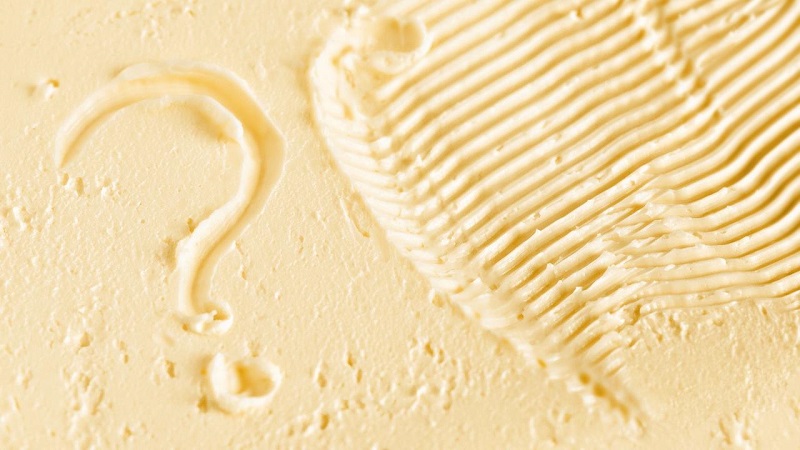Confused at the supermarket deciding on margarine or butter? Should we choose margarine for it’s ‘cholesterol reducing’ abilities? Do we avoid the high saturated fat of butter? Or is butter better?? Don’t fret – here is the low down.
Margarine was created in the 1800s in France when a cheaper alternative to butter was requested by Napoleon III. It is a vegetable oil based spread that should contain approx. 80% oil – with a ‘butter’ flavour. Since the 1960’s when the ‘reduce your saturated fat’ myth was created, margarines become popular as they did not contain saturated fats from animals which were blamed for high cholesterol levels.
1. Margarines contain trans fats
Through the processing of margarine trans fats are created. Trans fats are artificial fatty acids created in an industrial process when hydrogen is added to liquid vegetable oils to make them more solid. Studies have shown that trans fats raise your LDL or ‘bad’ cholesterol levels whilst lowering your HDL or ‘good’ cholesterol levels. Eating trans fats increases your risk of developing heart disease & stroke & are associated with a higher risk of developing type 2 diabetes. Despite many manufacturers claiming their margarine no longer contains trans fats, if the label says partially hydrogenated oils, it will still contain 0.5-1% of trans fat, which if eaten over a lifetime is still detrimental to your health.
2. Margarine is ‘low’ in fat
If a margarine is called low fat it may contain gelatin to help keep the spread solid & will have preservatives added to stop it from going rancid once half the fat has been removed. Remember, less fat equals less flavour & the potential for more added salt to make up for the blandness. Just as with butter, light or low-fat usually means that a spread has added water & fillers to reduce the overall fat & calorie count.
3. Margarine fortification is wasted money
Some spread producers will add extra calcium or vitamin D as a selling point. However, as servings of spreads are generally small (or they should be!) you won’t be getting much nutritionally from the fortifications but you will have a higher grocery bill.
4. Margarines won’t help you to reduce cholesterol levels
In the last few years there has been hype around margarine containing plant sterols which help to reduce LDL levels. However, the reality is you’re just not going to reduce cholesterol levels by eating this type of margarine. Nutritionists & Dieticians recommend that you would get more benefit from healthy diet & exercise than sitting down to a tub of this spread!
5. Margarine is artificially coloured
The urban myth of margarine being grey before yellow colourings is added is still being debated. Some say its black, others say a dull white. Our research says that it is the colour of lard. Whichever way you look at it why would you want to eat a product that HAS to be coloured to make it look appetizing?
So what about butter? Despite the bad press butter isn’t bad for you. In fact it is a natural product that humans have been eating for centuries without any detrimental effects. Regular butter made with cow’s milk is high in vitamins, contains fats which are good for the brain & nervous system & has anti-oxidant properties. Recent research out of the US is confirming that margarine is damaging to our health & that the animal saturated fats found in butter are still ok to have in moderation.
It’s important to do your own research to decide what foods are best for you. But when it comes to the margarine vs butter debate, do you want the quick option of a soft & easy spread or do you want the most natural?

